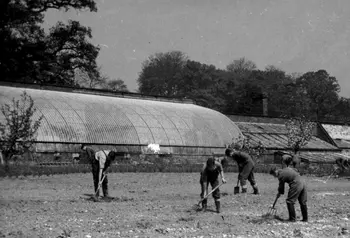Bringing privately owned historic houses to a wider audience

Compelling stories can spring not only from the architecture of our nation’s houses, their expansive landscapes or beautiful gardens but also from the families that have cared for these places for centuries - and the wider communities whose lives have been touched by their connections with the estates.
In a speech in Birmingham last year, our chair Sir Peter Luff challenged custodians of heritage to do more to share such stories. He made the case for connecting with a wider audience in line with HLF’s aim to help heritage make a lasting difference for people and places.
These are just two great examples of interesting projects funded by Our Heritage:
The Glasshouse at Millichope Park
The glasshouse at Millichope Park, a Grade II* listed estate in Shropshire owned by the Bury family, dates from around 1836. It is one of just four surviving iron-framed, curved glasshouses in the country. Sadly it has not been used since the 1950s. An important part of England’s horticultural history, once restored it will mean visitors can learn both new and old horticultural skills during practical courses held in the structure.
Felton Park Greenhouse
The Grade II* listed greenhouse and potting shed, set within the 1774 stove-walled garden at Felton Park, was built around 1830 and follows the recommendations of John Claudius Loudon, the great garden designer and “hothouse” expert. With HLF support, the greenhouse and potting shed are in the process of being restored. The work is being carried out under the supervision of specialist conservation architects, who are coordinating three skills: stonemasonry, metal conservation and glazing. Over the course of the project the team have been updating their website with images and video. Find out more on the Felton Park Greenhouse website.
The commitment we made, as part of our strategy to open the Our Heritage programme to private owners, remains strong, as long as owners show that public benefit from their project will be greater than any private gain.
Frequently asked questions
Q. Will it take a long time to fill in the application form?
Not necessarily. We have tried to make our online application forms as simple as possible. If you have planned and costed your project well, and can clearly demonstrate what you hope to achieve, the process will be a lot easier. You may need to supply some supporting information, the more concise the better. If the supporting material doesn't add anything, leave it out.
If you need help applying, get in touch with your local development team.
Q. Does listing grade affect the decision–making?
No. HLF is interested in funding heritage across a broad spectrum. Architectural interest is one aspect of what makes a place special, but things such as social history are important too. We simply ask you to demonstrate why the heritage you care for matters to you and your local community.
Q. Is there a lot of competition for Our Heritage funding?
In short, yes: our grant programmes are often over-subscribed. However, we try hard to ensure that good projects are supported and experience shows that projects can often be successful on a second attempt.
Q. What are outcomes?
Outcomes are the benefits that your project will deliver. We ask that Our Heritage projects deliver benefits for heritage, people and places. For example you could show that as a result of HLF support your heritage will be better managed or in better condition, that people will have learned about heritage through visiting your estate or that the local economy will be boosted by additional visitors. We have 14 outcomes but projects do not have to meet them all in order to receive funding. It is often better to focus on achieving two or three of the outcomes well rather than trying to meet them all.
Q. Is it a good idea to use a consultant to help write our application?
It is usually better to write your own application so that you can tell the story in your own words. However we realise that you might need to obtain advice from consultants in specialist areas.
Q. Are there any specific conditions attached to grants?
We will ask you to sign a grant contract with a standard set of terms and conditions. These can be found on the Our Grant Programmes page.
Any more questions?
Hopefully this blog addresses some of the questions that commonly arise about HLF support for private owners. Our regional development teams can give tailored advice and support via the phone or email and sometimes meet potential applicants to get a better understanding of the project.
Otherwise, why not visit our online community where you can ask questions of successful applicants and gain ideas and inspiration from people already delivering projects.
Most importantly, please don’t be afraid to ask for help!
[Editor's note: a version of this blog first appeared in the Spring 2016 issue of Historic Houses Association magazine.]
